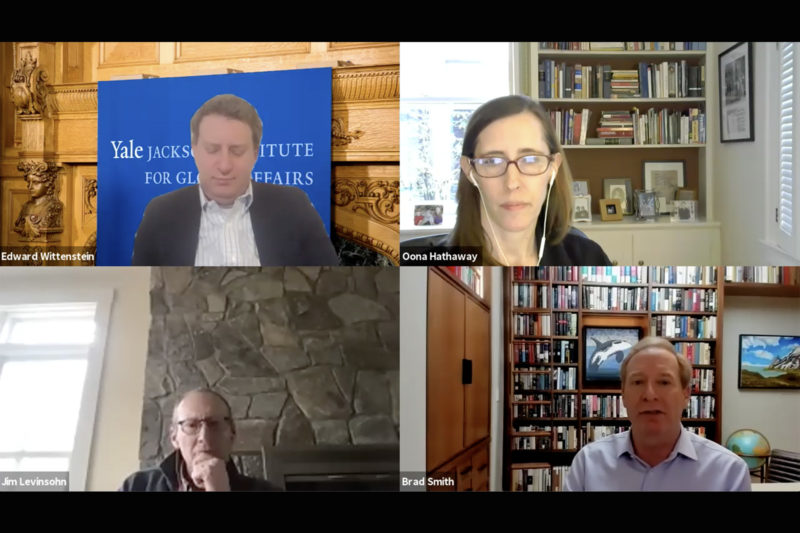Brad Smith, the president of Microsoft, was the featured speaker for the May 8, 2020 Virtual Discussion Forum on COVID-19 and Global Affairs.
One of the world’s leading tech executives offered his insights on the technological ramifications of the COVID-19 pandemic. Brad Smith, the president of Microsoft and co-author of “Tools and Weapons: Promise and Peril in the Digital Age,” was the featured speaker in this afternoon’s installment of Jackson’s Virtual Discussion Forum series on COVID-19 and Global Affairs.
Oona Hathaway, the Gerard C. and Bernice Latrobe Smith Professor of International Law and Director of the Center for Global Legal Challenges at Yale Law School, served as moderator for the conversation, “Cyber Threats and Opportunities in the Digital Age.”
Ted Wittenstein, Jackson’s deputy director for leadership programs, and Jim Levinsohn, Jackson’s director, offered brief opening remarks and introductions.
Smith, whose company operates in 120 countries and had a “front row seat” on the crisis, was asked to comment on the economic and security implications of moving so many aspects of our lives online so quickly. Smith touched on the digital divide and the lack of broadband access as a barrier for many, and predicted a need for more digital skills as the crisis continues into the fall.
He offered some simple advice for improving security: use two-factor authentication. “It’s like putting on a seatbelt in a car,” he explained.
Smith also commented the need for multilateral cooperation and new global norms for cybersecurity. “The pandemic has shined a light on the issue,” he said, particularly on the importance of protecting our elections and our hospitals from cyber attacks.
“This is an opportunity to think harder on something that demands attention,” Smith said.
Smith was also asked to talk about the role that tech companies can play in the recovery, specifically with facilitating contact tracing.
One silver lining of the crisis: state governors are now making critical decisions based on data, Smith observed. “Data is an indispensable tool for fighting this virus.”
More than 280 attendees joined the online discussion and had the opportunity to submit questions.
